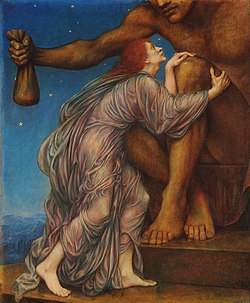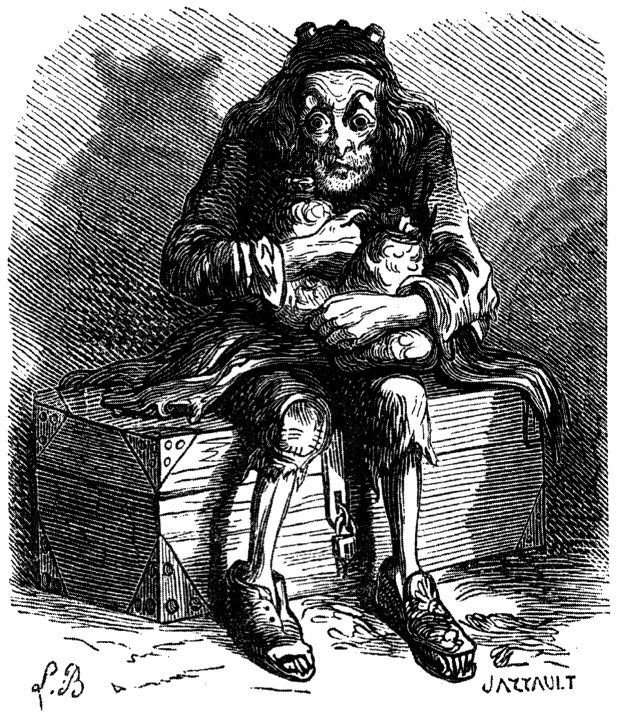| Revision as of 17:51, 1 February 2013 editDoug Weller (talk | contribs)Edit filter managers, Autopatrolled, Extended confirmed users, Oversighters, Administrators263,757 edits unsourced← Previous edit | Revision as of 02:25, 18 February 2013 edit undoRyulong (talk | contribs)218,132 editsNo edit summaryTag: Addition of interwiki linkNext edit → | ||
| Line 77: | Line 77: | ||
| ] | ] | ||
| ] | ] | ||
| ] | |||
| ] | ] | ||
| ] | ] | ||
Revision as of 02:25, 18 February 2013
For other uses, see Mammon (disambiguation).Mammon is referred to in the New Testament to describe material wealth or greed, most often personified as a deity, and sometimes included in the seven princes of Hell.

Etymology
Mammon derives from Late Latin 'mammon', from Greek 'μαμμωνάς', Syriac 'mámóna' (riches), Aramaic 'mamon' (riches, money), a loan word from Mishnaic Hebrew 'ממון (mmôn) meaning money, wealth or possessions; although it may also have meant 'that in which one trusts'. (Scholars are divided about the etymology.)
The Greek word for "Mammon", μαμμωνάς, occurs in the Sermon on the Mount (during the discourse on ostentation) and in the parable of the Unjust Steward (Luke 16:9-13). The Authorised Version keeps the Syriac word. John Wycliffe uses "richessis".
Christians began to use the name of Mammon as a pejorative, a term that was used to describe gluttony and unjust worldly gain in Biblical literature. It was personified as a false god in the New Testament.{Mt.6.24; Lk.16.13} The term is often used to refer to excessive materialism or greed as a negative influence.
The Revised Standard Version (RSV) of the Bible explains "mammon is a Semetic word for money or riches." The International Children's Bible (ICB) uses the wording, "You cannot serve God and money at the same time."
Personifications

"Lay not up for yourselves treasures upon earth, where moth and rust doth corrupt, and where thieves break through and steal: But lay up for yourselves treasures in heaven, where neither moth nor rust doth corrupt, and where thieves do not break through nor steal: For where your treasure is, there will your heart be also. No man can serve two masters: for either he will hate the one, and love the other; or else he will hold to the one, and despise the other. Ye cannot serve God and mammon." - Matthew 6:19-21,24 (KJV)
In the Bible, Mammon is personified in Luke 16:13, and Matthew 6:24, the latter verse repeating Luke 16:13. In the Greek, Luke 16:9 and Luke 16:11 also personify Mammon.
Early mentions of Mammon appear to stem from the personification in the Gospels, e.g. Didascalia, "Do solo Mammona cogitant, quorum Deus est sacculus"; and Saint Augustine, "Lucrum Punice Mammon dicitur" (Serm. on Mt., ii). Gregory of Nyssa also asserted that Mammon was another name for Beelzebub.
During the Middle Ages, Mammon was commonly personified as the demon of gluttony, richness and injustice. Thus Peter Lombard (II, dist. 6) says, "Riches are called by the name of a devil, namely Mammon, for Mammon is the name of a devil, by which name riches are called according to the Syrian tongue." Piers Plowman also regards Mammon as a deity. Nicholas de Lyra (commenting on the passage in Luke) says: "Mammon est nomen daemonis" (Mammon is the name of a demon).
No trace, however, of any Syriac god of such a name exists, and the common literary identification of the name with a god of covetousness or avarice likely stems from Spenser's The Faerie Queene, where Mammon oversees a cave of worldly wealth. Milton's Paradise Lost describes a fallen angel who values earthly treasure over all other things. Later occultist writings such as De Plancy's Dictionnaire Infernal describe Mammon as Hell's ambassador to England. For Thomas Carlyle in Past and Present, the 'Gospel of Mammonism' became simply a metaphoric personification for the materialist spirit of the nineteenth century.
Mammon is somewhat similar to the Greek god Plutus, and the Roman Dis Pater, in his description, and it is likely that he was at some point based on them; especially since Plutus appears in The Divine Comedy as a wolf-like demon of wealth, wolves being associated with greed in the Middle Ages. Thomas Aquinas metaphorically described the sin of Avarice as "Mammon being carried up from Hell by a wolf, coming to inflame the human heart with Greed".
In various countries
- "Mamona" (sometimes "Mamuna") is a synonym for Mammon in Slavic countries. Currently, the word "mamona" is used figuratively and derogatorily in the Polish language as a synonym to money. This, however, has biblical origins; see above. The word "mammona" is quite often used in the Finnish and Estonian languages as a synonym to money.
- In Spanish culture, where Mammon is not so well known, the image used to criticize the love of wealth is the golden calf, idolized by the Israelites against the will of God.
- In German the word "Mammon" is a colloquial term for "money".
- In Arabic the word "amaana" means a financial or material trust held for someone else. Its triliteral root is /aleph - mim - nun/ and so it is likely a cognate with Syriac "mámóna". Sumerian, however, is not a Semitic language though it was supplanted by Akkadian, which is Semitic. In the Quran, a character named Haman, is mentioned together with the name Pharaoh on six occasions in two surahs, 28:6; 28:8; 28:38; 29:39; 40:34; and 40:36. Muslim tradition identifies this Haman as a person of incredible wealth.
- In Mexico, "un Mammon" is used to denigrate someone who has a certain superior air about him.
Popular culture
Main article: Mammon in popular cultureVarious characters, demons, have taken the name Mammon in books, film, TV, anime and video games.
See also
- Asceticism
- Christian demons in popular culture
- Christian views on poverty and wealth
- Evangelical counsels
- Jewish views of poverty, wealth and charity
- Prosperity theology
- Vow of poverty
References
- Webster's Dictionary of the English Language Unabridged: Publishers International Press, New York, 1977.
- ^ Hastings, James, ed.; New York, Scribners, 1908-1921, Encyclopedia of Religion and Ethics, Volume 8:374
- John Parkhurst, Edition 5, 1809, Oxford University, A Greek and English lexicon to the New Testament. To this is prefixed a Greek grammar, p414 (Aramaic = Chaldee)
- Michael Sokoloff, JHU Press, Jan 3, 2003, A Dictionary of Jewish Babylonian Aramaic of the Talmudic and Geonic Periods, p.682
- Translation and definition "ממון", Dictionary Hebrew-English online (Modern Hebrew)
- Howard H. Covitz, PhD, March 30, 2000, Shabbos and Proper Nouns: "When scriptural translators chose not to translate ממון (mammon), this common Babylonian-exile word for money, they effectively neutered the Galilean’s admonition against idolizing riches, against wealth-worship, by thus-making scripture resonate with proscriptions against another transgression, against the worship of strange Gods."
- Fernandez, Miguel Perez (1999). An Introductory Grammar of Rabbinic Hebrew. Brill. p. 5. ISBN 978-90-04-10904-9.
{{cite book}}: Unknown parameter|Hebrew&hl=ignored (help) - ^ R. T. France, 'God and Mammon' in The Evangelical Quarterly, Vol. 51 (Jan.-Mar. 1979), p. 9
- Bible - Revised Standard Verion (RSV), footnotes p6 NT Mt 6:24, Melton Book Company, 1971
- International Children's Bible p. 482 Mt 6:24 (Word Publishing, 2003)
- The Catholic Encyclopedia: An International Work of Reference on the Constitution, Discipline, Doctrine, and History of the Catholic Church, C. G. Herbermann, E. A. Pace, C. B. Pallen, T. J. Shahan, and J. J. Wynne, editors, pg. 580, "Mammon" by Hugh Pope. The Encyclopedia Press, New York, 1913.
- Select Notes on the International Sabbath School Lessons, F. N. Peloubet, W. A. Wilde and Company, Boston, 1880.
- becerro de oro in the Diccionario de la Real Academia Española.